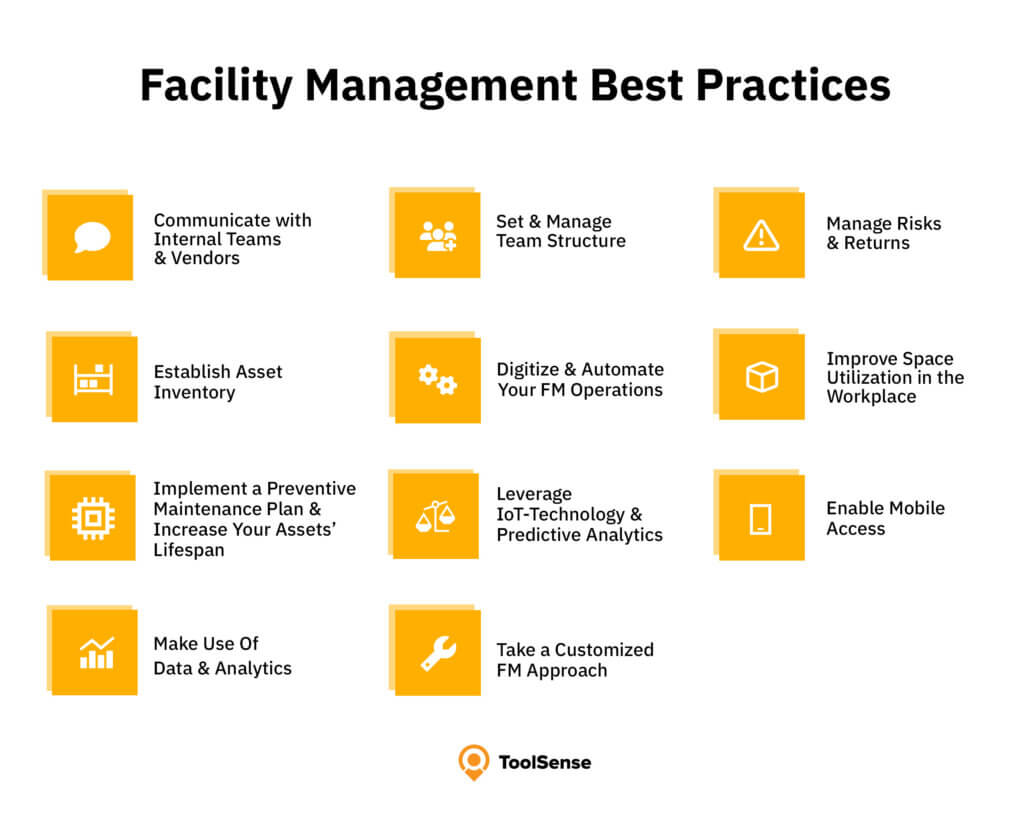Secret Fads Forming the Future of Facility Administration in 2024
As we look in advance to 2024, the landscape of facility management is positioned for considerable change, driven by several vital patterns. The integration of clever building technologies and a change towards data-driven decision-making promise to boost functional effectiveness while focusing on sustainability in technique.
Smart Structure Technologies

Smart building technologies include a large variety of systems, consisting of smart lights, cooling and heating controls, and security systems. By integrating these systems, facility managers can monitor and adjust parameters in real-time, leading to significant reductions in power waste and functional prices. For example, clever sensing units can find tenancy degrees and change lighting and temperature accordingly, ensuring that power is just utilized when needed.
Furthermore, these innovations help with enhanced information collection, permitting organizations to track usage patterns and recognize chances for further renovations. The execution of smart structure modern technologies not only adds to sustainability objectives yet also creates much healthier work environments that can enhance worker productivity and satisfaction.
As we relocate into 2024, the fostering of wise structure innovations will likely accelerate, mirroring a wider change towards even more intelligent, receptive, and sustainable center management methods.
Data-Driven Decision Making
Significantly, organizations are leveraging data-driven choice making to enhance center management methods. By using data analytics, facility managers can derive workable insights that substantially enhance operational effectiveness and source allotment. The assimilation of advanced innovations, such as IoT sensing units and real-time monitoring systems, allows the collection of substantial quantities of information on building efficiency, occupancy rates, and energy intake.
This wealth of info permits center managers to determine fads, predict maintenance requirements, and proactively address concerns prior to they escalate. As an example, anticipating analytics can anticipate tools failures, decreasing downtime and repair service prices. Furthermore, information visualization devices promote far better interaction among stakeholders, ensuring that informed choices are made collaboratively.
Moreover, data-driven methods improve calculated preparation by allowing center supervisors to examine the performance of current practices and make informed options pertaining to financial investments in modern technology or facilities. As organizations progressively focus on operational excellence, data-driven decision making is positioned to come to be a keystone of effective center administration methods in 2024 and beyond. Ultimately, the ability to leverage information properly will encourage organizations to create more efficient, effective, and durable facilities.
Sustainability and Green Practices
The focus on data-driven choice making naturally aligns with the expanding emphasis on sustainability and green practices within center administration. As organizations significantly focus on environmental duty, center managers are leveraging analytics to maximize resource usage, lower waste, and lessen carbon footprints. This critical technique enables the assimilation of energy-efficient systems, such as LED illumination, click over here now smart cooling and like it heating controls, and eco-friendly energy resources into center operations.
Moreover, the execution of sustainable techniques prolongs past power usage. Facility supervisors are taking on green materials and advertising recycling efforts to create a circular economic situation within their facilities. This not just boosts the environmental profile of the organization but additionally fosters a society of sustainability among workers.
Conformity with environmental guidelines is an additional important aspect driving the adoption of environment-friendly practices. By using information analytics, center managers can keep an eye on conformity metrics and identify areas for enhancement, making certain adherence to global and local sustainability standards.
Hybrid Job Versions
A significant shift towards hybrid job versions is improving the landscape of facility management in 2024. This paradigm integrates in-office and remote job, necessitating a reevaluation of space usage, resource allowance, and staff member engagement methods. Organizations are significantly identifying the relevance of flexible workspaces that satisfy diverse needs and preferences.
Facility managers have to adapt by applying versatile workplace designs that support joint efforts while more helpful hints giving areas for focused job. This includes the combination of modern technology to help with smooth interaction and collaboration amongst in-office and remote workers. Smart structure solutions, geared up with analytics and sensors, permit real-time tracking of room usage, allowing companies to maximize their environments efficiently.
Moreover, crossbreed job versions stress the demand for reliable facility management that prioritizes employee experience. In essence, the hybrid work version is changing center administration, motivating a positive technique to satisfy the developing demands of the workforce.
Boosted Owner Health
As companies welcome hybrid work models, a heightened focus on owner health is ending up being indispensable to center monitoring methods. Facility Management. This shift recognizes that a healthy and pleased labor force straight affects productivity and retention prices. Center managers are currently focusing on environments that advertise physical and psychological wellness, incorporating aspects such as natural illumination, biophilic design, and easily accessible wellness resources

Modern technology plays a crucial role in this advancement. Smart structure systems can check ecological aspects and change settings in real-time, ensuring optimal comfort degrees - Facility Management. Comments systems, such as occupancy sensing units and worker surveys, permit facility managers to consistently fine-tune wellness initiatives based on occupant demands.

Final Thought
In 2024, the future of center administration will be dramatically influenced by the combination of clever building innovations and data-driven decision-making, cultivating improved operational effectiveness. Sustainability initiatives will certainly prioritize environmentally friendly methods, while the emergence of crossbreed job models will require versatile workplace layouts. Additionally, an increased concentrate on owner health through advanced heating and cooling systems and biophilic style will certainly add to much healthier workplace. These fads collectively emphasize the developing landscape of facility administration in feedback to modern obstacles and possibilities.
Facility supervisors are promoting and taking on green materials recycling initiatives to create a circular economic climate within their centers.A substantial shift in the direction of hybrid job designs is reshaping the landscape of center administration in 2024.Furthermore, crossbreed job versions highlight the requirement for effective center management that prioritizes worker experience.As organizations embrace hybrid job versions, an increased emphasis on occupant wellness is becoming essential to facility monitoring strategies.In 2024, the future of facility management will certainly be significantly affected by the combination of wise structure innovations and data-driven decision-making, cultivating improved functional efficiency.